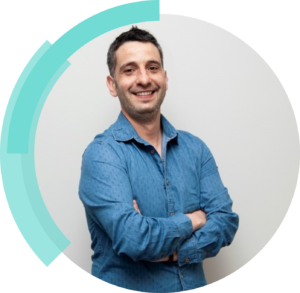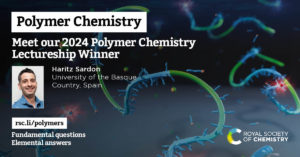We are delighted to announce Professor Haritz Sardon (University of the Basque Country) as the recipient of the 2024 Polymer Chemistry lectureship!
This award, now in its tenth year, honours an early-career researcher who has made significant contribution to the polymer field. The recipient is selected by the Polymer Chemistry Editorial Board from a list of candidates nominated by the community.
Haritz Sardon is an Associate Professor at the University of the Basque Country since 2021 and Group leader at POLYMAT. He graduated from the University of the Basque Country in 2011 with honours before joining the group of Dr Hedrick at IBM Almaden Research Centre as a Postdoc in 2012, where he spent 2 years. In 2014 he returned to Spain with a Spanish Ministry grant and joined POLYMAT as a group leader. Haritz Sardon has participated in 145 peer-reviewed publications, with more than 70 as corresponding author. The impact of his work can be measured by his increasing number of citations, near 2000 in 2023. He has been awarded with several awards including the ACS Macomolecules Young Investigator Award, Excellence of Young Researcher in Chemistry Award by the Spanish Royal Society (2021) and the Excellence of Young Researcher in Polymers Award by the Grupo Español de Polímeros (2020). His overall research aims to prepare new functional polymeric materials using sustainable polymerization processes. Specifically, his investigations involve the use of green polymerization processes such as monomers from plastic recycling, reagents from renewable sources or the use of less hazardous organocatalysts.
To learn more about Professor Sardon’s research, have a look at his most recent publication in Polymer Chemistry “Upcycling of BPA-PC into trimethylene carbonate by solvent assisted organocatalysed depolymerisation“, which is free to access until 15th June 2024, and featured in our Hot articles and Plastic Conversion collections. You can also check out articles from our previous lectureship winners in our lectureship winners collection.
 |
‘What I really like about Polymer Chemistry is that the articles are professionally handled by well-known experts in my field.’ |
Read our interview with Professor Sardon below:
How has your research evolved from your first article to this most recent article?
My scientific path always has been aligned with topics related with sustainability. As a PhD student I was working in trying to develop polyurethanes that are more sustainable. To do so my PhD project was focused on the preparation of polyurethane dispersions trying to find alternatives to traditional tin based catalysts. At that time in 2009 I managed to publish my first first author article (Prog. Org. Coat., 2009, 3, 291-295) where we showed that zirconium based catalysts could be used as sustainable alternatives for the production of waterborne polyurethanes. My group has been intensively working on alternative benign catalysts for the production of polymers. One of the most interesting catalysts that we have recently discovered is taurine (Adv. Sci., 2024, 10.1002/advs.202308956). The unique zwitterionic structure of taurine, where the negatively charged sulfonic acid group and the protonated amine group are separated by two methylene groups, not only provides high thermal stability but also leads to a dual activation mechanism that allows the polymerization of different monomers at elevated temperatures. More importantly it shows a lack of toxicity which is an important feature of this naturally occurring catalyst.
What excites you most about your area of research and what has been the most exciting moment of your career so far?
One of the most exciting moments of our group was when Dr. Coralie Jehanno (a former PhD student from our group) showed me that she was able to selectively depolymerize bisphenol A polycarbonate (BPA-PC) in the presence of Polyethylene Terephthalate (PET) (Angew. Chem., 2021, 12, 6710-6717). She developed a thermally stable catalyst that was able to depolymerize plastics in a selective fashion. This is one of the areas of research that excites me more in how to design strategies to solve the plastic problem issue. Indeed, we launched a start-up called POLYEY (https://www.polykey.eu/) with some of those ideas.
In your opinion, what are the most important questions to be asked/answered in your field of research?
In the field of chemical recycling of plastic there are still many open questions to be answered. The most important question to be answered in my opinion is how to translate all the fascinating research that is performed into society. Every day we see manuscripts coming related with plastic recycling but still the chemical recycling processes are not implemented at industrial scales. If we want to increase the circularity of plastics we must increase the plastic-to-plastic chemical recycling approaches, developing approaches that could industrially be implemented. To do so we need a stronger academic-industrial collaboration effort and incentives for companies implementing circularity into their products.
How do you feel about Polymer Chemistry as a place to publish research on this topic?
Polymer Chemistry is one of the leading polymer journals and one of the preferred places to publish the work of our group as shown by the more than 20 articles that we have already published. What I really like about Polymer Chemistry is that the articles are professionally handled by well-known experts in my field. I can easily identify the editor that is handling my work and I am convinced that she/he will treat my manuscript in a professional manner. Moreover, I also like that the article is usually evaluated at least by two expert reviewers that provide constructive comments to the work.
Which of your Polymer Chemistry publications are you most proud of and why?
One of my first articles as corresponding author, which I am really proud of, was published in Polymer Chemistry and was related with the preparation of non-isocyanate polyurethanes (Polym. Chem., 2016, 7, 2105-2111). In this article we manage to develop for the first time N-substituted 8-membered cyclic carbonate. This N-substituted 8 membered cyclic carbonate appeared to be much more reactive than the smaller 5- and 6-membered cyclic carbonates and allowed us to prepare high molecular weight polyurethanes even at room temperature. This work started to give us some recognition in the field of non-isocyanate polyurethanes one of the most intense areas of research of my group.
In which upcoming conferences or events (online or in person) may our readers meet you?
In 2024 I will assist with several conferences. I will be in the POLYCHAR 2024 (May 27-31 in Madrid, Spain), The polymers for Sustainable Future (June 24-28 Prague, Czech Republic) Gordon Research Conference in AM (Aug 11-16, Rhode Island, USA) International Symposium on Ionic Polymerization (Sep 1-5, Mainz, Germany) and the Spanish National Polymer Conference (Sep 16-19, Madrid, Spain). Hope to see you there.
Can you share one piece of career-related advice or wisdom with early career scientists?
For me science has always been really complex and at the same time fascinating. One of the things that I have done during the years is to foster collaboration with people around the world and to try to develop ideas together with another scientist. I have to say that scientists in general are really open minded and willing to collaborate with other people. For me the most important career-related advice is that if you feel that your research will advance much faster collaborating with somebody, just contact her/him to collaborate. You do not have anything so you cannot loss anything, but you have many things to win. I have collaborated with people in all the stages of my scientific career and this has helped me a lot during those years.
How do you spend your spare time?
I just came back from a vacational trip with my family in Tenerife. I have two small kids (5 and 2 years old) so you can imagine how my wife and I spend much of our spare time. However, when I have the opportunity I also practice one of my preferred hobbies which is swimming. And now that the summer is arriving I will take the opportunity to swim a little bit on the beach in the beautiful San Sebastian. Another passion of me and my family is to travel and to visit different places around the world.
We would like to thank everybody who nominated a candidate for the 2024 Polymer Chemistry Lectureship. The Editorial Board had a very difficult task in choosing a winner from the many excellent and worthy candidates.
Please join us in congratulating Professor Sardon on winning this award!











